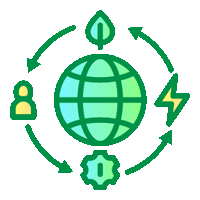What the new IFRS Sustainability Disclosure Standards
mean for business
Featured UQ Business School expert: Professor Kathleen Herbohn
Each year, Australian businesses diligently lodge statements and report their financial positions – their performances and projections guiding investors and stakeholders.
But increasingly, the market wants oversight of more than just the bottom line.
A groundswell of investors and business stakeholders are taking sustainability, clean energy and climate-related considerations into account when making financial decisions.
To ensure they have consistent, comparable and transparent information to guide these decisions, the International Financial Reporting Standards (IFRS) Foundation have released two new standards for disclosing a company’s sustainability and climate-related risks and opportunities.
 The University of Queensland (UQ) Business School Professor of Financial Accounting and Business Sustainability Initiative Research Hub Co-Lead Kathleen Herbohn said she welcomed the new measures as “a high-quality, comprehensive global baseline” for businesses.
The University of Queensland (UQ) Business School Professor of Financial Accounting and Business Sustainability Initiative Research Hub Co-Lead Kathleen Herbohn said she welcomed the new measures as “a high-quality, comprehensive global baseline” for businesses.
“Sustainability factors are becoming a mainstream part of investment decision-making as investors are demanding more information on companies’ long-term value creation opportunities and their wider impact on society,” Professor Herbohn said.
The IFRS Sustainability Disclosure Standards
IFRS S1: General Sustainability-related Disclosure
This standard requires a company to disclose information about its sustainability-related risks and opportunities in its financial report. Disclosures must relate to risks or opportunities that could impact the company’s prospects over the short, medium or long term. This standard recognises that a company’s financial performance is linked to its interactions with stakeholders, society and the environment across its value chain.
IFRS S2: Climate-related Disclosure
Similar to IFRS S1, this standard requires a company to disclose information about its climate-related risks and opportunities in its financial report. Climate-related financial disclosures must relate to governance, strategy, risk management, metrics and targets. This standard also specifies that businesses assess their climate resilience and disclose greenhouse gas emissions, internal carbon prices and the extent to which executive remuneration is linked to cross-industry metric categories and climate-related considerations and targets.
“Overall, this is a thoughtful, pragmatic approach that provides a solid foundation for companies to undertake sustainability-related disclosures,” Professor Herbohn said.
“It simplifies the ESG [environmental, social and governance] reporting process for companies by providing clear guidance and implementing uniform sustainability standards to reduce the reporting burden on companies that operate globally.”
A game changer for the environment
While the two standards are technically voluntary, jurisdictions including Australia, Canada, Japan and the United Kingdom intend to legislate their inclusion, with Australia working towards mandatory compliance in 2024.
Alexander Stathakis is an Associate Director – ESG and Sustainability at Rennie and a UQ Master of Business (2006) and Master of Technology and Innovation Management (2007) alum.
He labelled the new standards a “game changer” for sustainability and climate reporting.
“There's been a lot of inconsistency in how companies approach ESG reporting, which makes it difficult for investors and stakeholders to compare one company's efforts to another's or get a clear picture of a company's true impact or risk exposure,” Stathakis said.
“These standards add a layer of credibility and uniformity so stakeholders can more reliably evaluate how a company is performing on these fronts.
“It also forces companies to think more critically about their sustainability activities, given that they now have to disclose them in a structured way.
“There's a growing realisation among companies that compliance isn't just a regulatory burden but an opportunity to redefine their brand and gain a competitive advantage.”
Become a future business leader with a UQ Master of Business
Elevate your business with these 6 tips for implementing the
IFRS Sustainability Disclosure Standards
 1. Start the process now
1. Start the process now
Professor Herbohn suggested that business leaders should move quickly.
“Establishing necessary data collection systems and developing disclosures is a time-consuming process that evolves with every new reporting cycle,” she said.
Immersion and education should be the first step for businesses transitioning to the new reporting framework.
“Familiarise yourself with the nitty-gritty of these standards; ignorance is not an excuse when it comes to compliance,” Stathakis warned.
“Next, conduct a gap analysis to identify where your reporting practices fall short of the new requirements.
“This will give you a roadmap for what you need to address.”
 2. Commit to company-wide integration and immersion
2. Commit to company-wide integration and immersion
The new standards will have strategic implications for the entire business, so both Stathakis and Professor Herbohn recommended that companies foster a collaborative environment across departments and disciplines.
“The most successful companies bring together finance, operations, legal and marketing departments with sustainability teams to address the complex challenges and opportunities that come with these new standards,” Stathakis said.
“Establishing a cross-functional team can also help ensure a well-rounded approach to compliance given the focus on long-term sustainability and climate-related financial disclosures.”
Knowledge-sharing is also key to successful ongoing compliance, Professor Herbohn added.
“Risk arises when an individual who is passionate about sustainability is instrumental in setting up systems, but when they leave, this knowledge is lost,” she said.
“Avoid this risk by having teams work on the reporting or, at the very least, ensure you systematically document your processes.”
 3. Invest in the future
3. Invest in the future
Stathakis and Professor Herbohn concede the costs associated with compliance – from ensuring data accuracy, allocating resources and understanding compliance complexities – can be substantial, particularly for smaller businesses.
“Seek professional advice early in the process to minimise the costs,” Professor Herbohn said.
“There are many consultants who have been working on collecting climate-related data for the past decade.”
To further mitigate these costs, Stathakis also recommended companies invest in advanced data management systems to streamline their collection and reporting processes and improve accuracy and efficiency.
 4. Check the data
4. Check the data
As data will come under the spotlight like never before, companies must ensure their data is reliable and accurate.
“Implementing the IFRS sustainability and climate disclosure standards marks a shift toward more structured and mandatory reporting,” Stathakis said.
“Compliance is no longer optional; it's a requirement that investors, regulators and other stakeholders will scrutinise.
“This change mandates a closer look at data quality, especially concerning greenhouse gas emissions, and likely necessitates collaboration with experts in the field to ensure accuracy and reliability.”
 5. Stay open to collaboration
5. Stay open to collaboration
Tapping into business networks and industry associations can broaden access to support, guidelines and resources.
Additionally, forging partnerships with academic institutions and research organisations can provide companies with cutting-edge insights into sustainability practices and disclosure methods.
Not-for-profit organisations focused on sustainability can also offer practical support in implementing new initiatives.
Professor Herbohn suggested keeping an eye on competitors.
“Review the disclosures made by peers within the same industry and compare them to your company’s disclosures,” she said.
“This will provide a benchmark on how much investment is needed to comply with disclosure requirements.”
Read: Why many companies aren’t on track to meet net-zero by 2050 and how they can catch up
 6. Maintain transparency
6. Maintain transparency
Be transparent with your stakeholders about this transition, Stathakis advised.
“Use this change as a springboard for broader sustainability initiatives and communicate these efforts to your stakeholders,” he said.
“The initial investment in compliance can enhance your business operations and reputation and build credibility in a crowded marketplace.
“Companies that are forthcoming about their sustainability goals, challenges and achievements are generally better positioned to build stronger relationships with their stakeholders, including consumers who are increasingly voting with their wallets for more sustainable options.”
The next frontier
Looking to the future, Stathakis predicted the IFRS standards would evolve to meet a growing need for alignment across international financial reporting standards for small and medium-sized businesses.
“As issues like climate change continue to be global challenges, harmonising reporting standards across jurisdictions will become more critical,” he said.
“With technological advancements, I expect the standards to adapt, allowing for real-time reporting and greater transparency.”
Professor Herbohn envisaged a more integrated approach to commercial reporting; for example, businesses identifying “green revenue” in mainstream financial statements and companies disclosing how they incorporate climate change into capital allocation decision-making.
“In the short term, given the potential for advisory fees revenue, expect to see the large accounting firms producing disclosure guidance tools as well,” she said.
Staying ahead of the curve is crucial.
“As we face sustainability challenges on a global scale, there’s an incredible opportunity for companies to embrace these standards and become leaders in defining the next frontier of ESG and sustainability reporting,” Stathakis said.
“It's an exciting, albeit challenging, time.”
Find out how your organisation can build resilience and adapt to change by partnering with UQ Business School’s Business Sustainability Initiative.
Professor Kathleen Herbohn

Professor Kathleen Herbohn is a Professor of Financial Accounting and Co-Lead of the Business Sustainability Initiative Research Hub at UQ Business School. Her research is concerned with corporate social responsibility for issues such as climate change and tax transparency, with a focus on how public data can be used in debt and equity markets to inform stakeholders about organisational performance.
Alexander Stathakis

Alexander Stathakis is Associate Director – ESG and Sustainability at Rennie and a UQ Master of Business (2006) and Master of Technology and Innovation Management (2007) alum. He has over 13 years of specialised experience in GHG emissions and climate-related financial disclosure, with expertise spanning multiple sectors including aviation, tourism, resources and retail management. Before teaming up with Rennie, he founded Conversio, and previously worked for organisations like Telstra, EY, Net Balance, and what is now the Clean Energy Finance Corporation.

